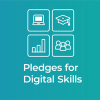Accessia - Belgium
Accessia is an innovative springboard that aims to getting people with disabilities who have difficulty accessing employment into work and improving the digital accessibility of online services. Working on real projects, Accessia takes into account their specific needs and ensures trainees acquire digital accessibility.
Accessia: an innovative and promising springboard
With the support of the DBSF and Cap48 and in collaboration with Diversicom, Citeco and Passe Muraille, Eqla created the inclusive web agency "Accessia". This innovative project is both:
- A specific accompaniment of people with disabilities (all disabilities combined) towards employment in the digital sector, with the aim of integration into a company.
- A project of digital accessibility through audits, accessibility standards of websites and applications and creation of accessible websites.
Services offered to clients
- Creation of accessible websites
- Accessibility audits of websites and mobile applications
- Support for accessibility projects for websites and mobile applications
- Community Management (+ webmaster)
- Training for all persons working on web development
Why is Accessia needed?
Barely 5% of applications are accessible to people with disabilities. However, good practices exist to make them accessible. Accessia helps professionals to integrate these standards into their projects, while training people with disabilities in web development. 25 to 30% of people are, to varying degrees, disabled on the Internet due to their specific needs related to sight, hearing, physical problems, cognitive disorders, age which naturally leads to a reduction in certain abilities.
These disabilities may be temporary or permanent. Some people navigate with the help of a voice synthesiser, a Braille bar or a breath switch, while others use the functions provided by computers such as the screen magnifier, the possibility of changing the contrast or the font
Digital accessibility criteria are known, published and updated by a panel of disabled people, web and disability professionals. Compliance with these standards and good practices allows all persons concerned to use the Web regardless of their disability and the way they access the site.
These accessibility criteria, the Web Content Accessibility Guidelines (WCAG), are not part of the curriculum of web and communication professionals. The situation on the ground is disastrous: today, less than 5% of websites respect all accessibility criteria.
Since September 2020, a European directive requires all public websites in the European Union to comply with these standards. In 2025, this obligation will be extended to private sites in the fields of transport, banking, insurance and e-commerce.
Why is this a good practice?
Accessia has accomplished several significant milestones in its mission to promote digital accessibility. Each year, the Accessia fully trains ten individuals in Web Content Accessibility Guidelines (WCAG) and (Référentiel Général d'Accessibilité pour les Administrations) RGAA audits, ensuring they are equipped with the necessary knowledge and skills.
Moreover, Accessia's commitment to inclusivity is evident as they manage to secure employment for half of these trainees within six months of completing their training. Emphasizing their dedication to diversity and equal opportunities, the organization has hired three individuals with disabilities for permanent positions within the Accessia structure.
Additionally, Accessia plays a vital role in making the digital landscape more accessible by creating six inclusive websites annually. They further contribute to enhancing web accessibility by conducting fifteen digital accessibility audits of websites or mobile applications every year, identifying areas for improvement and promoting universal usability.
Not limiting their efforts to their own projects, Accessia extends its impact by supporting fifteen website creation or redesign endeavors, ensuring compliance with WCAG standards. By doing so, they contribute to a broader positive impact on the overall digital accessibility landscape.
Recognizing the significance of education in fostering a more accessible digital environment, Accessia imparts knowledge to web professionals across various disciplines, offering ten training courses each year. These courses cover diverse fields such as development, design, content writing, and more, equipping professionals with the necessary expertise to contribute to a more inclusive online world.





